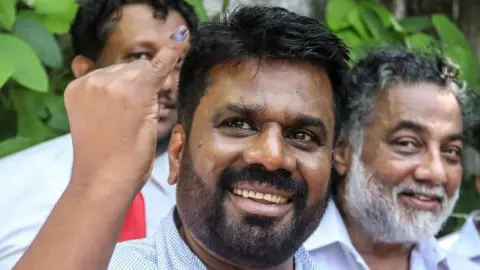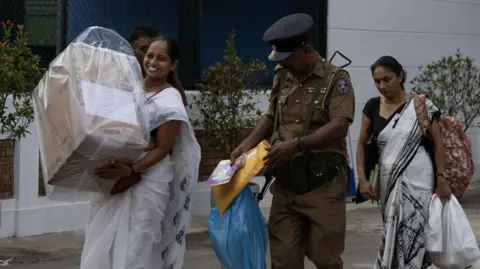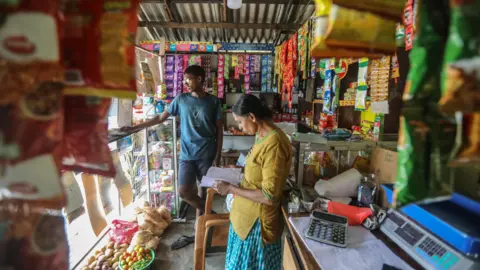Left-wing leader wins Sri Lanka election

 EPA
EPALeft-wing politician Anura Kumara Dissanayake has won Sri Lanka’s presidential election after a historic runoff vote.
No candidate won more than 50% of the total vote in the first round, where Dissanayake got 42.31% while his nearest rival, opposition leader Sajith Premadasa, got 32.76%.
But Dissanayake, who had promised voters good governance and tough anti-corruption measures, emerged victorious after the second count, which included voters’ second and third-choice candidates.
Saturday’s elections It is the first protest since mass demonstrations toppled the country’s leader, Gotabaya Rajapaksa, in 2022 after Sri Lanka suffered its worst economic crisis.
 Getty Images
Getty ImagesDissanayake, 55, told Sri Lankans that “this victory belongs to all of us” in a message on social media platform X.
After the preferences were counted, the Election Commission said he had won a total of 5,740,179 votes to Premadasa’s 4,530,902.
To revive the economy, Dissanayake has promised to develop the manufacturing, agriculture and information technology sectors. He has also pledged to continue the agreement reached with the International Monetary Fund (IMF) to pull Sri Lanka out of the economic crisis while reducing the impact of his austerity measures on the country’s poorest.
Until this weekend’s vote, Sri Lanka’s eight presidential elections since 1982 have seen a winner emerge in the first round of counting. The vote has been described as one of the closest in the country’s history.
Seventeen million Sri Lankans were eligible to vote on Saturday and the country’s electoral commission said it was the most peaceful poll in the country’s history.
Police nevertheless announced a curfew late Saturday night, citing “public safety reasons.” It was lifted at noon local time (0630 GMT).
Dissanayake promised voters tough anti-corruption measures and good governance – messages that resonated strongly with voters demanding systematic change since the crisis.
This allowed him to overcome his concerns about the violent past of his political party, the Marxist Janatha Vimukthi Peramuna (JVP), which led two armed insurrections against the Sri Lankan state in the 1970s and 1980s.
His alliance, the People’s National Party – of which the JVP is a part – rose to prominence during the 2022 protests, known as Aragalaya – meaning “struggle” in Sinhala.
He has also sought to moderate his party’s far-left stance in recent years.
Early results show him in the lead, prompting several high-profile figures, including the country’s foreign minister, to congratulate him.
But he lost ground to Premadasa as the vote progressed, necessitating a second round of counting.
Incumbent President Ranil Wickremesinghe won 17% of the vote, putting him third in the poll. He was eliminated in the second count, which was only between the two frontrunners.
Wickremesinghe congratulated his successor.
“With great love and respect for this beloved nation, I hand over its future to the new president,” Wickremesinghe said in a statement.
Economic collapse
The country’s new president will face the dual task of reviving the economy and lifting millions of people out of crushing poverty.
The economic collapse fueled the Aragalaya (struggle) uprising that toppled Rajapaksa from the presidential palace in 2022.
By this time, Sri Lanka’s foreign currency reserves had dried up, leaving the country unable to import basic necessities such as fuel. Public debt had soared to $83 billion while inflation was running at 70 percent.
This has made basic goods like food and medicine unaffordable for ordinary people.
The country’s economic misery is blamed on major policy mistakes, weak exports and years of undertaxation. It has been made worse by the Covid-19 pandemic, which has stifled tourism, a key economic driver.
But many have also pointed the finger at corruption and mismanagement, stoking anger at Rajapaksa and his family, who collectively ruled Sri Lanka for more than a decade.
 EPA
EPA“The most serious challenge is how to restore this economy,” Dr Athulasiri Samarakoon, a political scientist at the Open University of Sri Lanka, told the BBC Sinhala Service.
During his term, Wickremesinghe had secured a $2.9 billion bailout from the International Monetary Fund (IMF), which is essential to open additional financing channels but comes with tough economic policy and governance reforms.
Sri Lanka has been restructuring its debt repayment terms to foreign and domestic creditors as required by the IMF. The focus has been primarily on the country’s $36 billion external debt, of which $7 billion is owed to China, its largest bilateral creditor.
Like Dissanayake, Premadasa also pushed for information and communication technology and the creation of 25 new industrial zones. He said tourism should be supported so that it becomes the country’s main source of foreign exchange.
Wickremesinghe said during the campaign that he would double tourist arrivals and create a national wealth fund, as well as new economic zones to increase growth.
Additional reporting by BBC Sinhala



